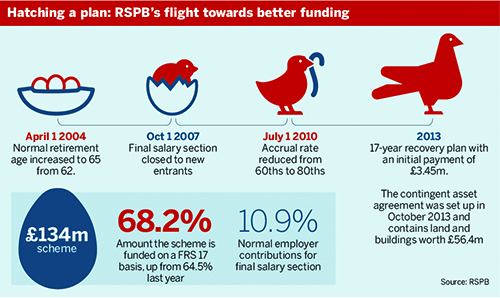The bird protection charity RSPB has set up a £56.4m contingent asset agreement with its pension scheme as part of a wider effort to reduce the funding deficit.
The asset agreement forms part of a 17-year recovery plan. Contingent assets can increase a scheme’s security by guaranteeing ownership of that asset should the sponsor be unable to meet its obligations.
They can also be used to boost the funding level without the risk of money being trapped inside once full funding is reached.
The recovery plan is part of a series of measures from RSPB to address its deficit. These include increasing staff contribution rates and the normal retirement age, reducing spouse death-in-service benefits and the accrual rate, and closing the final salary section of the scheme to new entrants.

According to RSPB’s most recent report and accounts, the agreement contains £56.4m worth of land and buildings, which will underpin the recovery plan.
The agreement states the assets will be transferred to the scheme should the charity be unable to meet its contribution obligations.
In the past year the scheme’s funding level has risen to 68.2 per cent from 64.5 per cent on an FRS 17 accounting basis.
Tim Pons, financial controller at RSPB, said the deficit was largely down to historically low bond yields, and the extended recovery plan was a deliberate decision to mitigate their effect.
“This arrangement was made in the belief that yields are likely to at least partially recover over the timescales relevant to the scheme,” he said.
Lynda Whitney, partner at consultancy Aon Hewitt, said contingent assets were commonly used to underpin a strategy aimed at closing the deficit.
“It might be around having a longer recovery plan or having more investment risk on the table,” she said.
Vicky Carr, partner at law firm Sackers, said certain types of contingent assets could be relatively simple for employers to set up, and were often preferred by schemes for this reason.
She said: “Trustees appear to be more comfortable with assets like property because you can get them valued.”
Broader flightpath
The RSPB pension scheme contains sections for final salary and cash balance. All new members of the scheme accrue benefits in the cash balance section after the final salary portion was closed to new members in 2007.
The recovery plan requires the charity to pay additional contributions of around 3 per cent of income each year until 2030. The initial payment was £3.45m.
“The payments are structured to allow a review of the arrangement after each triennial valuation,” said Pons. The next triennial valuation is due in July 2016.
However, he added that changes in certain valuation factors, such as interest rates rising by 2 per cent, could also accelerate the end of the recovery plan.

























